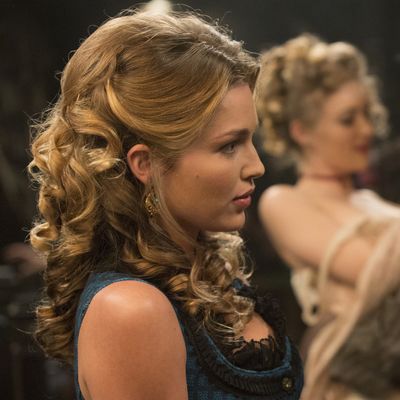
Following each week’s episode of Westworld, show composer Ramin Djawadi (Game of Thrones) will be Vulture’s guide to the music.
Finally, a little confirmation.
In this week’s episode of Westworld, we find out that Debussy’s “Reverie” is connected to the programming of the hosts. We see the song listed on Ford’s tablet when he calms down an overwrought Maeve during a moment when she’s not responding to verbal commands. Ford calls the song “an old trick from an old friend,” suggesting that the music choice comes from Arnold, and that the trigger is strong enough to overpower the host’s cognition. “The music is being controlled, and it’s being chosen for a reason,” show composer Ramin Djawadi said. “The great power of music is that something subconsciously happens when you listen to a piece of music, even if you don’t pay full attention to it. It just does something to us that nothing else can do, other than music.”
As we’d suspected, we also get more confirmation that the saloon’s player piano is as much of a signal to the hosts as it is to the guests: The Animals’ version of “House of the Rising Sun” plays just as a reprogrammed Maeve begins to understand how Delos has replaced Clementine using a new host. (Is it a coincidence that the song is about the regrets of spending time in a brothel in New Orleans, just as Maeve’s “memory” tells her it’s a place she’s been before?)
“She realizes the whole thing is just a loop, and it doesn’t really matter,” Djawadi said. “She’s trying to break out of it. Her whole consciousness and awareness is happening more and more, and she’s realizing that the host body doesn’t really matter, that they’re replaceable. So her relationship to Clementine doesn’t really matter.”
Once Maeve decides to recruit her army, the player piano kicks in with the first female song of the series, Amy Winehouse’s “Back to Black.” Even though we don’t hear the lyrics, they seem appropriate for Maeve: “I died a hundred times … You go back to her and I go back to black.” It could be a commentary on both how the hosts are expected to die, over and over, as well as having their memories wiped each time. Maeve’s next act is one of resistance — she breaks out of her loop, takes control of the narrative, and orchestrates both the music and the scene at the same time.
We’ve seen the narrative of Hector’s heist of the Mariposa with a couple variations: The first time featured the Rolling Stones’ “Paint It Black,” and now with Maeve in control, she opts for Tchaikovsky’s Swan Lake, perhaps meant to soothe the hosts now submitting to her suggestions, rejecting Delos-scripted chaos for a new order.
“It’s a different kind of control, now that the consciousness has shifted,” Djawadi said. “The question is, who’s driving this? And if they hear the music in their heads, how do they feel about it? Music is always a big part of how somebody feels, but now it’s from her perspective. She’s in the driver’s seat: ‘Now I’m picking my songs.’”




